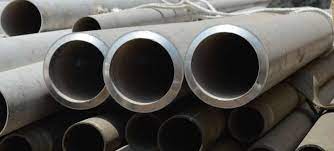Whether you’re in chemical, petrochemical, food processing, or power generation industry, the use of high-quality materials is essential to ensure the performance, efficiency, and reliability of any industrial process. One such material that has proven to be exceptional in these industries is stainless steel 317, particularly the tubes. In this blog post, we’ll discuss what Stainless Steel 317 Tubes are, their properties and benefits, and how they are used in various industrial applications.
What are Stainless Steel 317 Tubes?
Stainless steel 317 is a high-performance austenitic stainless steel alloy primarily designed to resist corrosive chemical environments. It contains high levels of molybdenum and chromium which give it exceptional corrosion resistance, particularly against corrosive acids, pitting, and general corrosion. The tubes are a type of piping system made from stainless steel 317, and they come in different dimensions with varying wall thicknesses ranging from 0.5mm to 6mm.
Properties and Benefits of Stainless Steel 317 Tubes
Stainless steel 317 tubes possess a host of impressive properties that make them ideal for use in various applications, especially those involving corrosive and high-temperature environments. These properties include superior corrosion and pitting resistance, high tensile strength and durability, low magnetic permeability, and excellent machinability. The tubes are also easy to weld, bend, and fabricate, making them highly versatile. Additionally, they are non-toxic, making them ideal for use in the food and beverage processing industry.
Applications of Stainless Steel 317 Tubes
Stainless steel 317 tubes have an array of applications in various industries. They are commonly used in chemical processing plants, pharmaceuticals, oil and gas refineries, pulp and paper mills, petrochemicals, and food processing plants. In these industries, the tubes are used to transport corrosive chemicals, fluids, and gases. They also find extensive use in heat exchangers, pipelines, condensers, boilers, and evaporators due to their exceptional resistance to corrosion, high temperatures, and pressure.
Maintenance and Cleaning of Stainless Steel 317 Tubes
While stainless steel 317 tubes are highly durable, corrosion resistant, and easy to maintain, they still need regular care and attention to ensure optimum performance and longevity. To keep them clean and free from corrosive buildup, it's recommended to use mild detergents, warm water, and non-abrasive cleaners to clean the tubes. Avoid using abrasive materials and chloride-containing cleaning agents that can damage the surface of the tubes, leading to premature corrosion.
Conclusion:
Stainless steel 317 tubes have earned a reputation for being one of the most reliable and efficient piping systems in various industries. Their exceptional corrosive and high-temperature resistance, high durability and strength, and versatile fabrication make them the ideal choice for transporting fluids and gases and providing heat exchange in harsh and corrosive environments. Whether you are a chemical processing plant, petrochemical, oil and gas refinery, or food processing plant, incorporating stainless steel 317 tubes in your processing pipelines and heat exchangers ensure high performance and longevity, allowing you to minimize downtime, save on maintenance, and ensure high productivity levels.






